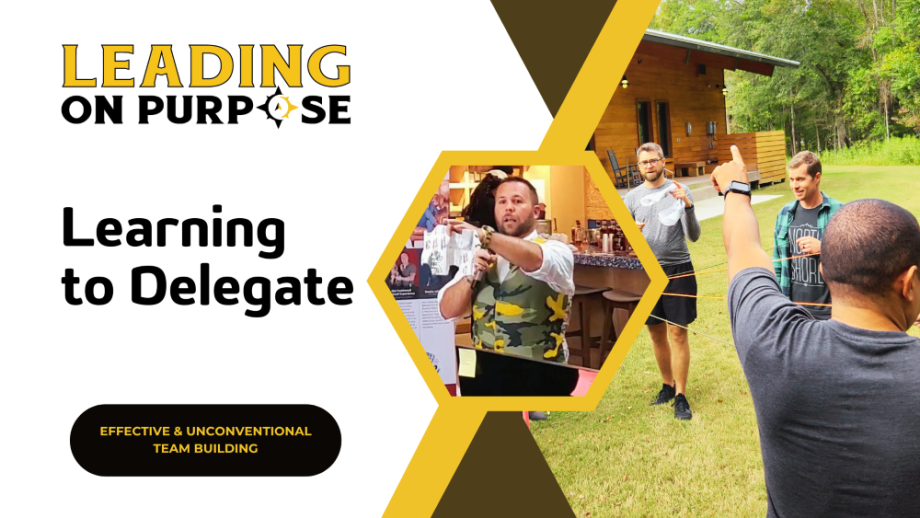
Learning to Delegate
For over a decade, I’ve been running my own businesses, and while I’ve mastered some things, delegation is still a challenge. Handing over important aspects of my work, especially when I care so deeply about my business, has been tough. I know I can handle the tasks, but I haven’t given others the opportunity to prove whether they can.
My mindset often drifts into uncertainty:
- What if an event doesn’t go as planned?
- What if we let a client down?
- What if I could have done it better?
I can only stretch so far, though. At On Purpose Adventures, I manage sales, design events, and facilitate activities. I’m fortunate to have an incredible team to assist with facilitation, but I’ve struggled to pass off the event design.
Utilize Emerging Technologies for Onboarding
In order to delegate effectively, I have to recognize which tasks are uniquely mine and which I can teach others. Recently, I’ve been hiring new assistants, both locally and internationally, and the biggest challenge has been onboarding. Training someone new takes time and energy, but technology has been a game changer, making this process much more streamlined and scalable.
I utilize voice and screen recordings to train new employees, using services like Vimeo or Loom. Instead of spending hours in repetitive one-on-one training sessions, I create voice and screen recordings using platforms like Vimeo or Loom. These tools enable me to walk employees through processes, step-by-step, capturing all the nuances that a live demonstration might miss. The videos can be revisited by team members whenever they need a refresher, eliminating the need for constant retraining.
I use Scribe to make pdfs of processes. These documents break down workflows into simple, digestible steps with screenshots and annotations, ensuring that even the most complex tasks are easy to follow. As an added bonus, having a library of these PDFs not only helps onboard new hires faster but also provides a living, adaptable resource that can be updated as systems and processes evolve.
These tools make onboarding more efficient and effective. By incorporating these technologies, I’ve been able to reduce the time and friction involved in onboarding, allowing me to focus more on big-picture growth initiatives while trusting that new team members have the tools they need to succeed.
Shifting My Leadership Mindset Toward Delegation
The key is shifting my mindset:
- What am I willing to let go of?
- How much of my hesitation is tied to ego?
- If a task is done 70-80% the way I would do it, is that good enough?
I'm open to constant evolution as a leader. I don't close myself off toward learning new ways things can be done. I’ve had to confront the idea that being deeply involved in every aspect of my business isn’t necessarily what’s best for its growth. It’s easy to think that only I can execute my vision perfectly, but that belief has been one of my biggest limitations.
After taking the time to hire a terrific new employee, entrepreneurs then have to trust others to bring their unique skills to the table. Empower teams to take ownership and contribute to the organization's success.
By holding onto every responsibility, I've not only limited my capacity but theirs as well. I’ve come to realize that delegation is a tool for developing others, and it’s a sign of trust, not weakness.
This shift in mindset has made me ask tough questions: Am I resisting delegation because I believe no one else can do the job as well, or am I simply afraid of losing control? I’ve learned that if a task is done well enough—meaning 70-80% of the way I would do it—that’s still progress. In fact, that remaining 20% often represents an opportunity for my team to bring fresh ideas, creativity, and innovation. It’s no longer about perfection; it’s about progress and allowing others to grow in their roles.
I’ve also had to embrace the idea that mistakes might happen—and that’s okay. Growth comes from trial and error, and if I want my team to take on more responsibility, I need to create a space where they feel safe to learn. If something goes wrong, it’s not the end of the world. What matters is how we adapt and improve. In fact, this willingness to step back and let others take the lead can result in better outcomes, as it allows for diverse perspectives and approaches I may not have considered.
Right now, I’m working on having others handle game design and scavenger hunts. This will free up my time to focus on sales. One of my biggest growth hurdles is my own belief that I need to be involved in everything. We’re only operating at 10% capacity, but with the right help, we could do so much more.
In 2016, a year before we officially decided to buy Nature Adventures, we hired our first part-time salaried manager at On Purpose Adventures. This was a pivotal moment that kick-started the development of our Standard Operating Procedures (SOPs). For the first time, I began pulling a lot of the processes that had been in my head and putting them on paper. This allowed us to bring in an office manager who took over invoicing, emails, scheduling, and other administrative tasks. It was a big and sometimes painful transition, and for over a year, this manager was earning more than I was! But the investment in training and documenting our processes paid off, as it freed me up to focus on the newly acquired business.
This process made it clear how crucial it is for a small business to document everything. My team now regularly creates SOPs for tasks they do repeatedly, ensuring that if someone is out of the office, someone else can step in seamlessly. It’s all about making the business run smoothly, no matter who’s at the helm.
When we took over Nature Adventures in 2017, we inherited a seasoned manager who had been with the company for years. She had a wealth of knowledge but also saw that knowledge as job security. People in the office would constantly have to call her for answers, and she enjoyed being the one with all the solutions. We made it clear that while her expertise was invaluable, we impressed upon her two things:
- We wanted to empower our younger staff to solve problems on their own. By documenting the key information in her head, we could distribute that knowledge across the team. Through this process, we empowered our office team to find answers and solve issues independently.
- Delegation gave our seasoned manager more flexibility in her own life. For the first time in over a decade, she was able to take a summer vacation, a huge milestone in a seasonal industry. A couple of years into our ownership, two of her daughters needed her, and she was able to take 2 to 3 weeks off to be with them, knowing that the business could run smoothly in her absence. That flexibility was a direct result of putting her expertise into documented processes, and it made a significant difference for her and the team.
Delegation is a work in progress, but I’m excited to see how stepping back in some areas will allow us to step up as a team.
For more on this topic, check out these blog posts:









